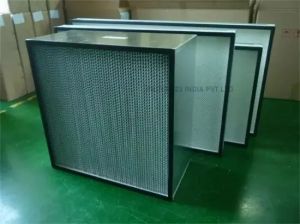
Pre Air Filter
Get Price Quote
10 Piece (MOQ)
Pre Air Filter "pre air filter" is typically used in the context of industrial or commercial air filtration systems, particularly in settings where there is a need to capture large particles and contaminants before they reach the main air filtration system. Here are some key points about pre air filters: Purpose: The primary purpose of a pre air filter is to act as a preliminary filter stage in an HVAC or industrial air handling system. It captures larger particles, such as dust, debris, and coarse contaminants, before the air passes through the main or final filter stage. By doing so, it helps prolong the lifespan of the main filters and improves their overall efficiency. Construction: Pre air filters are typically constructed with a coarse filter media, often made of materials like foam, fiberglass, polyester, or metal mesh. This coarse media allows them to capture larger particles effectively while allowing relatively unrestricted airflow. Installation: Pre air filters are usually installed upstream of the primary air filtration system. They are positioned in such a way that incoming air first passes through the pre filter, where larger particles are captured, before moving on to the main filtration stage. Maintenance: Depending on the type of pre air filter used, maintenance can involve cleaning or replacing the filter media when it becomes clogged or too dirty to function efficiently. The maintenance frequency will vary depending on the specific application and the level of contamination in the air. Benefits: The use of pre air filters offers several advantages, including: Improved Main Filter Efficiency: By capturing larger particles, pre filters help extend the life of more expensive and fine-grade main filters, reducing their replacement frequency. Reduced Maintenance Costs: Regularly replacing or cleaning pre filters is generally more cost-effective than servicing or replacing the primary filtration system. Enhanced Air Quality: Removing larger particles at the pre filtration stage can contribute to better indoor air quality and reduce the risk of blockages or damage to HVAC equipment. Applications: Pre air filters are commonly used in various settings, including manufacturing facilities, data centers, commercial buildings, and industries with high levels of dust, such as woodworking, metalworking, and construction. In summary, pre air filters play a crucial role in industrial and commercial air filtration systems by capturing larger particles and contaminants before they reach the main filter stage. This helps maintain the efficiency of the entire filtration system, reduces maintenance costs, and improves indoor air quality in various applications.

HEPA Air Filter
Get Price Quote
1 Piece (MOQ)
HEPA, which stands for High Efficiency Particulate Air, refers to a type of air filter that is designed to remove very small particles from the air. HEPA filters are commonly used in various applications to improve air quality by trapping particles like dust, pollen, pet dander, and even some bacteria and viruses. Here are some key points about HEPA filters: 1. Particle Removal: HEPA filters are highly effective at capturing particles as small as 0.3 microns with an efficiency of 99.97%. This includes common allergens and fine particulate matter. 2. Construction: HEPA filters are typically made from a dense mat of randomly arranged fiberglass fibers or other materials. These fibers create a maze-like structure that traps particles as air passes through. 3. Applications: HEPA filters are used in a wide range of applications, including residential air purifiers, HVAC (heating, ventilation, and air conditioning) systems, cleanrooms, hospitals, laboratories, and industrial settings where air quality is critical. 4. Air Purifiers: HEPA filters in air purifiers are effective at improving indoor air quality by removing allergens and pollutants. They are particularly beneficial for individuals with allergies or respiratory conditions. 5. Vacuum Cleaners: Some vacuum cleaners use HEPA filters to capture fine dust and allergens, preventing them from being released back into the air. 6. Cleanrooms: In industries like pharmaceuticals, electronics manufacturing, and biotechnology, HEPA filters are used to maintain a sterile environment by removing airborne contaminants. 7. Certification: To be classified as a true HEPA filter, a filter must meet specific standards and be tested and certified to have a minimum efficiency of 99.97% for particles of 0.3 microns in size. Filters that don't meet these criteria may be called HEPA-type or HEPA-style filters. 8. Maintenance: Regular maintenance, such as replacing or cleaning HEPA filters as recommended by the manufacturer, is essential to ensure their continued effectiveness. HEPA filters play a vital role in improving indoor air quality and maintaining sterile environments in various industries. When selecting a HEPA filter or an appliance that uses one, it's important to check for certification and consider the specific requirements of your application.
Best Deals from HVAC System

Aroma Diffuser
Get Price Quote
Aroma Diffuser